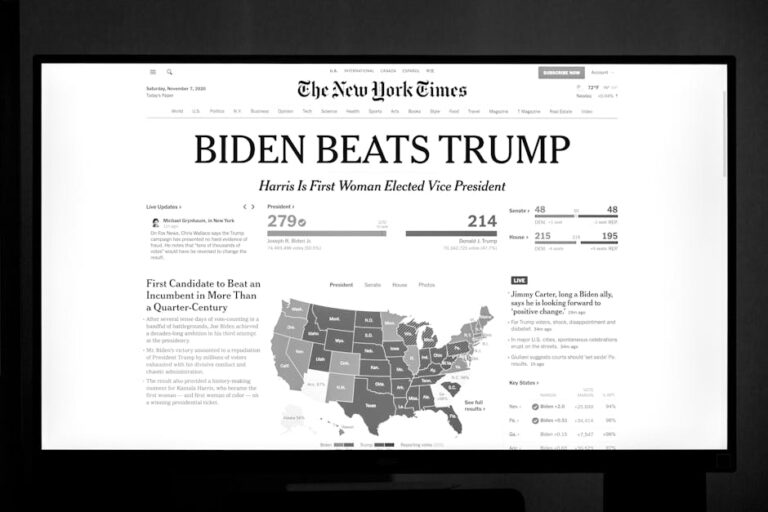Joe Biden: A Deep Dive into the Life and Presidency of the 46th US President
Early Life and Political Career of Joe Biden
Joseph Robinette Biden Jr., the 46th President of the United States, has had a long and impactful career in American politics. Born on November 20, 1942, in Scranton, Pennsylvania, Biden’s early life instilled in him a strong sense of working-class values and empathy. His family moved to Delaware when he was 10, shaping his future political ties to the state. He attended the University of Delaware and Syracuse University College of Law, laying the groundwork for his future legal and political career. His career began with his election to the New Castle County Council in 1970, marking the initial step in his remarkable political journey. This early foray into local politics provided the foundation for his future national prominence.
Biden’s entry into the national political scene came with his election to the U.S. Senate in 1973, a position he held for 36 years. During his time in the Senate, he established himself as a prominent figure, known for his ability to work across the aisle and forge bipartisan compromises. He served on various key committees, including the Judiciary Committee, where he played a significant role in shaping legislation related to criminal justice and law enforcement. He was also a strong advocate for issues such as crime prevention, foreign policy, and healthcare.
Key Senate Achievements and Legislative Initiatives
Biden’s Senate career saw him spearhead numerous significant legislative initiatives. His work on the landmark Violent Crime Control and Law Enforcement Act of 1994, while achieving some success in crime reduction, also faced considerable criticism for its contribution to mass incarceration. This remains a complex and controversial aspect of his legislative legacy. He was also a vocal supporter of the 1990 Americans with Disabilities Act, demonstrating his commitment to social justice and equal opportunities.
Beyond specific legislation, Biden’s contributions extended to his role as a prominent voice on foreign policy. His deep understanding of international affairs and his involvement in key foreign policy debates shaped the US foreign policy landscape for years. His chairmanship of the Senate Foreign Relations Committee from 2001 to 2003 allowed him to significantly influence American foreign policy, shaping the discourse around critical issues and fostering relationships across the globe.
Biden’s Vice Presidency under Obama
In 2008, Barack Obama selected Biden as his running mate in the presidential election. This marked a pivotal moment in Biden’s career, transforming him from a seasoned senator into a key figure on the national stage. As Vice President, Biden played a critical role in the Obama administration, serving as a trusted advisor and contributing significantly to the administration’s policy successes. His role wasn’t strictly limited to ceremonial duties; he actively engaged in critical policy discussions and played a significant role in shaping policy outcomes.
Biden’s involvement in the economic recovery efforts following the 2008 financial crisis highlighted his practical approach to complex issues. He worked closely with the Obama administration to implement policies aimed at stimulating the economy and rescuing the US from the depths of the financial crisis. His role in these crucial economic decisions left an indelible mark on his political legacy.
Key Roles and Responsibilities as Vice President
- Economic Recovery: Biden played a key role in shaping and implementing the economic stimulus package designed to address the 2008 financial crisis.
- Foreign Policy: He traveled extensively, representing the US in international forums and engaging with world leaders. His deep experience in foreign policy allowed him to make significant contributions to the Obama administration’s foreign policy efforts.
- Gun Violence Prevention: Biden championed initiatives aimed at reducing gun violence, reflecting his long-standing commitment to public safety.
- Cancer Moonshot Initiative: He led the Cancer Moonshot Initiative, a national effort aimed at accelerating cancer research and treatment.
Biden’s 2020 Presidential Campaign and Election
Following his vice presidency, Biden announced his candidacy for the Democratic presidential nomination in 2019. His campaign focused on themes of restoring dignity and unity to American politics, emphasizing his long experience and his ability to bridge divides. He positioned himself as a moderate Democrat, appealing to a broad range of voters. He faced challenges from more progressive candidates within the Democratic party, but ultimately secured the nomination.
The 2020 presidential election was highly contested, with significant implications for the future of the country. Biden’s campaign focused on issues such as healthcare, climate change, and economic inequality. His election victory marked a significant turning point in American politics, ushering in a new era in the White House. His victory against Donald Trump marked a shift in political sentiment and represented a return to traditional Democratic policy platforms.
Biden’s Presidency: Policies and Achievements
Biden’s presidency has been marked by a series of ambitious policy initiatives, addressing key issues facing the nation. The American Rescue Plan, a massive economic stimulus package, aimed to mitigate the economic fallout from the COVID-19 pandemic. The Infrastructure Investment and Jobs Act, a bipartisan infrastructure bill, represents a major investment in rebuilding America’s infrastructure. These initiatives demonstrate his commitment to addressing some of the most pressing challenges facing the United States.
Key Policy Initiatives and Legislative Achievements
- American Rescue Plan: Aimed to provide economic relief to individuals and businesses affected by the COVID-19 pandemic.
- Infrastructure Investment and Jobs Act: A bipartisan bill focused on upgrading America’s infrastructure.
- Climate Change Initiatives: Biden has set ambitious targets for reducing greenhouse gas emissions.
- Social Justice Reform: Biden’s administration has focused on advancing social justice and racial equality.
Criticisms and Controversies Surrounding Joe Biden
Despite his long career and significant accomplishments, Joe Biden’s presidency and career have not been without criticism and controversy. Some critics point to his role in the 1994 crime bill and its impact on mass incarceration. Others question his stance on certain foreign policy issues, while some express concerns about his age and fitness for office. These criticisms highlight the complexity of assessing his legacy and the diverse perspectives on his political career.
Addressing these criticisms and controversies is crucial for a comprehensive understanding of Joe Biden’s impact. It’s important to examine the context surrounding these events and consider the diverse perspectives on these criticisms. Openly acknowledging and analyzing these aspects is essential for a balanced and nuanced view of his career and political impact.
Conclusion: Joe Biden’s Legacy
Joe Biden’s journey from Scranton, Pennsylvania to the White House is a testament to his resilience and dedication to public service. His decades-long career has been marked by significant legislative achievements, diplomatic successes, and significant challenges. His presidency continues to shape the political landscape, and his legacy will undoubtedly be a subject of ongoing discussion and debate for years to come. Analyzing his various roles and experiences offers valuable insights into his approach to governance and policy-making, enabling a comprehensive understanding of the complexities of his long and influential career.
Understanding Joe Biden’s career requires a careful examination of his legislative record, his foreign policy decisions, and the criticisms leveled against him. A balanced assessment must consider the complexities and nuances of his many years in public service, allowing for a richer appreciation of his enduring impact on American politics and society.



